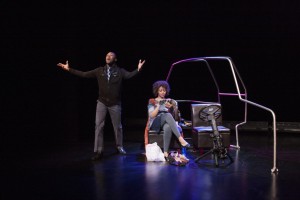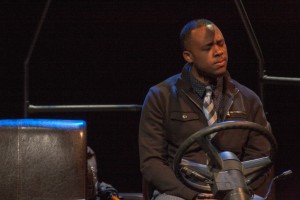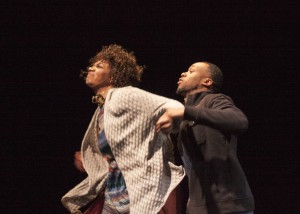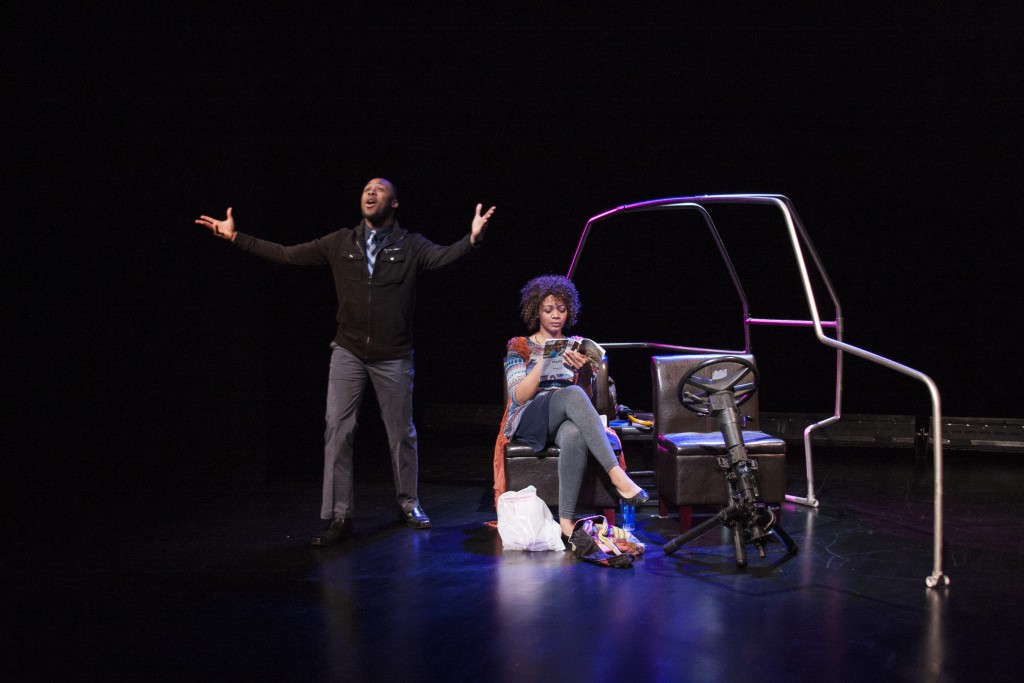“The problem was that the disasters showed all the signs of arousal—of being in fight-or-flight mode—in their relationships. Having a conversation sitting next to their spouse was, to their bodies, like facing off with a saber-toothed tiger.” —Emily Esfahani Smith, June, 12, 2014, The Atlantic

In Matthew Ivan Bennett’s newest play ‘A/Version of Events,’ the married couple of Cooper and Hannah, both in their middle 30s, would fit psychologist John Gottman’s description of ‘disaster’ couples. In a study spanning six years, Gottman and Robert Levenson, his research colleague at the University of Washington, brought couples to their lab, asking them to talk about their relationships. Meanwhile, the researchers measured their blood flow, heart rates and sweat output from electrodes hooked up to their bodies. Six years later, the researchers followed up with the couples to see if they were still married.
Gottman and Levenson characterized couples as either masters, who had managed to stay together six years after the first research, or as disasters, who were divorced, separated or had described themselves as disappointed and irreconcilably unhappy. The physiological differences were profound between each type of couple. In fact, even talking about routine or pleasant aspects about their relationships, disaster couples would leap quickly into attack and defense modes, as their heart rates soared and their behavior toward each other quickly became more aggressive.
Cooper and Hannah, the two characters in Bennett’s play which has its premier run beginning today on the Plan-B Theatre stage, are heading west through Pennsylvania on their way to Hershey’s Chocolate World. In 90 minutes, the tensions mount with ever-increasing force and urgency over whether this disaster couple’s relationship will survive and heal after the death of their child.

The play, directed by Christy Summerhays, promises to pack the same sort of potentially unsettling emotional punch that was seen in the 2013 production of Eric Samuelsen’s ‘Nothing Personal,’ a surreal masterpiece that pierced brilliantly through the ethical and moral concerns of torture and the preservation of civil liberties. However, in Bennett’s play, the characters and dialogue are as starkly realistic as imaginable, even as some of their words will sound strangely humorous in an unintentionally dark way.
Bennett’s latest play took shape relatively quickly, in less than two years. It started, as he explains, from a “most honest, most unglamorous” perception about seeing two people talking in a car and wondering what secret is being shared between them. While the play is not autobiographical, Bennett did rely on experiences he witnessed from his formative years in shaping the play’s incursion into how people try to cope with the grief especially when a child dies. His earliest memory came from his adolescent years, when he was 12, and his sister, who was two years older, was babysitting at a nearby home where an infant died of Sudden Infant Death Syndrome (SIDS). Then, on his 19th birthday, Benjamin, his infant step-brother, died of Trisomy 18, also known as Edwards Syndrome in which a large majority of fetuses with the disorder die before birth.
Bennett recalls that, in his youth, it was difficult to comprehend the suffering his baby step-brother endured and, more pointedly, the religious tenets of Mormon faith and love that attempted to mitigate the most acute pangs of grief with mollifying words of a purpose, a plan, a destiny that suggested loved ones would be reunited in a non-specified afterlife. Hence, in ‘A/Version of Events,’ we learn the child also had disabilities.

It becomes evident early in the play—set entirely with an automobile—that Cooper and Hannah hardly can manage calm or warm affectionate gestures. There is scant evidence of trust or intimacy. Cooper’s attempts to ‘bid’ for connection with Hannah are awkward to the point of ensuring the response will be minimal at least or hostile at worst. One easily can gauge just how vulnerable and precarious their relationship is just in observing how each partner reacts to a minor or even silly diversion. During a rest stop, Cooper updates his mom on a cellphone call:
“She’s making me question, Mom. I want to put it past me I’m trying to I’d rather play Slug Bug and bat our eyes at each other but here’s Day Ten of our vacation: into Manhattan outta Manhattan, in rush hour, as in taxi cabs whizzing by us on the shoulder wrecking ten feet away and I’m calling Jason and Jamie whom we haven’t seen in six years saying no brunch tomorrow because she wigs out at Ground Zero, as in flips—she doesn’t cry at the funeral, but the gate to Ground Zero gets her going—so forget our plans. We have a room at the Gershwin?, ooo, but irony, we’re at the Wawa in Pennsyl-frickin’-vania: a place of great tradition, Mom, going back to self-service and buffalo chicken bites! So, it’s been one ‘a those. And I’m trying to remember what you said I’m trying to be still to know God is there, or fake it, but I’m fixating, Mom, and if you say ‘Just talk to her’ she refuses to talk and the more she refuses the more I think…”

More so than his other works, Bennett is scrupulously specific in how he has drawn the characters in ‘A/Version of Events.’ Reading the script already conjures up compelling, clear images of Cooper and Hannah. In the well-experienced hands of actors Carleton Bluford (whose premiere as a playwright just ended with the Plan-B production of ‘Mama’) and Latoya Rhodes, the roles assuredly will be realized in every detail and degree that might be worthy of, say, the research setting Gottman and Levenson undertook in their work.
When Hannah is talkative, it is clear that any bid for emotional connection and intimacy is likely to fail:
“Do you feel like food tasted better when you were little? Gummy Worms, cheeseburgers, apple juice. Because a child, unlike us, lives in linear time? I mean they’re not little angels, it’s not that, it’s ’cause they have nothing To Do, so their brains burst into flame over a cookie. But when you’re old you have this crap, clawing at you—’Gotta call the plumber why’s my partner being weird is it my blubber?, Why am I still at this job? You wanted to be a foreign correspondent and now you’re sending the van to get footage of a pile-up on I-80.’ You see the world through a screen, and you think ‘I used to be warm inside,’ and then you slump in the car, before the sun’s up, your thoughts tumble down. Your politics—pro-life/pro-choice—they tumble down; your confusion—Is there a soul?—it tumbles. And it’s only a foreboding, an anger, an emptiness without logic—you have all this crap and each piece has a cost, each one x units of energy, and they suck away your will, you have these First World Things like flies biting you. Bills ‘n church ‘n Christmas, and you don’t remember dreaming. You sit in the shower, a question mark, literally, you’re bent over, getting a hump like old ladies, and you know you had a dream. And it could’ve been you in a garden with the Heavenly Mother or you on a toilet in Fashion Place mall, you don’t know, because you can’t afford to remember, so you dry your hair, and avoid thinking about it, and slice an Elberta peach at breakfast, a perfect one—it’s soft, it’s blushing—and you put it on your tongue…but you don’t taste anything.”

Cooper seems hopelessly flummoxed, stupefied at his wife’s attitudes, which he sees as unrecognizable relative to her old self. Hannah, who says she is trying to find a less acutely painful place, is not apologetic and criticizes her husband for pretending by way of empty yet telling gestures. She no longer wants to keep up the appearances for Cooper’s satisfaction and, most certainly, their neighbors, whom she sees just as invasive as the starling birds that apparently are laying waste to the pear tree in their yard at home.
Their emotional failures have rendered an overwhelming sense of contempt, forcing a damaging blindness toward each other’s intentions that still remarkably may hint at trying to settle things and make the relationship right once again. Bennett’s play is so realistically cast that it will shake some prospective audience members to the point of wondering why they should be sitting through ‘A/Version of Events.’ At some point, all relationships and marriages undergo significant transformations, especially in the satisfaction each spouse sees in the bond. The question then is, through initially those petty, nagging grievances and then ultimately through those profound events of life and death leading to grief, separation and loss, can two people still find ground for responding in the most basic forms of human kindness.
Performances will run March 5-15, with shows Thursdays, Fridays and Saturdays at 8 p.m., Saturdays at 4 p.m., and Sundays at 2 p.m. in the Studio Theatre at Rose Wagner Center for Performing Arts in downtown Salt Lake City.
Ticket information for ‘A/Version of Events’ is here.

